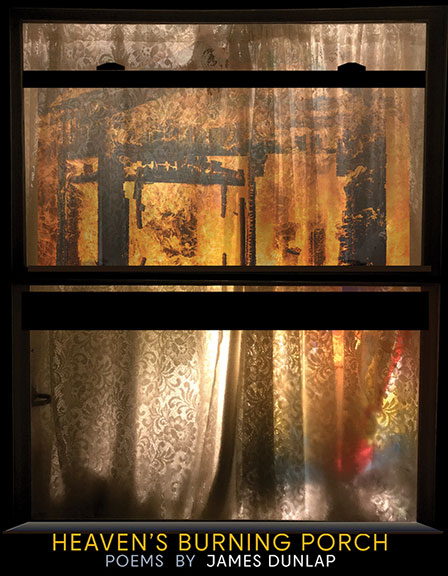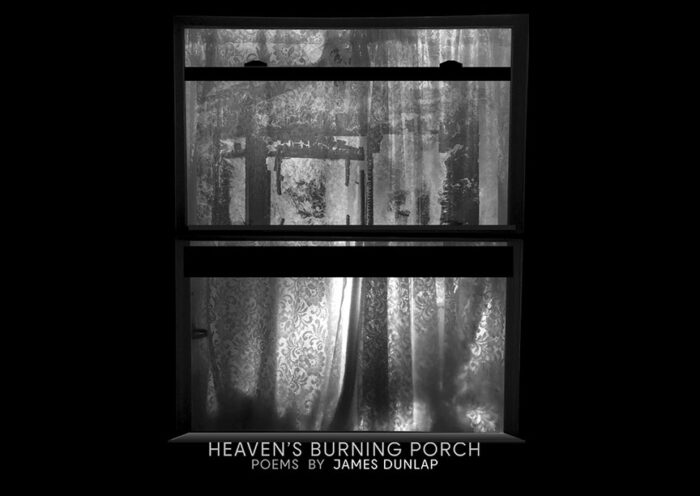Review by Jacob Butlett
Heaven’s Burning Porch
by James Dunlap
Texas Review Press, 2022

Replete with visceral images of his native Arkansas, James Dunlap chronicles intergenerational, male trauma in his wonderous poetry collection Heaven’s Burning Porch (Texas Review Press, 2022). A remarkable achievement in storytelling and poetic lyricism, Dunlap’s poetry features striking appositives and gut-wrenching revelations of childhood malaise and spiritual angst. The book’s central mood, ominous and melancholic, looms over each page like a blood-encrusted axe teetering on a high shelf, keeping me on the edge of my seat.
It would be hard, if not foolish, to overlook the craft decisions Dunlap employs throughout Heaven’s Burning Porch. Most notably, he weaves carefully constructed descriptions reinforced with consonance and similes. In “The Dark Herd,” Dunlap talks about his father and dead animals, another unnerving, impressive motif in the book:
Daddy razzes my hair too hard and he smells like corn cobs and gin,
puts up his calloused palms for me to punch. He grabs me up and heaves me
over his shoulder like a stringer of dead rabbits.
The image of a boy dangling “like a stringer of dead rabbits” is shocking enough. But sound repetition, like a symphonic, hypnotic refrain, makes the images and their connotations even more memorable—unless, of course, such repetition is overused.
Beautiful sounding verse for its own sake can have a wonderful effect on a reader. But drawing deeper connections between sound and sense—personal narrative and musicality, for instance—can be for both writer and reader exhilarating and even aspirational. Notice in “The Dark Herd,” for example, the repeated L-sounds: in “smells” and “callused” and in the double similes “like.” Dunlap not only wishes to showcase consonance but to make his images and their similes stand out.
Some critics, however, may argue that Dunlap uses too many similes, that they stand out too much. I would disagree with those critics for one key reason: the similes are nonetheless formidable—refreshing and clear. In fact, I value Dunlap’s figurative language and its profound impact on the reader’s imagination. Similes appear frequently throughout the book; many of his sentences end with direct similes introduced with the word “like.” In “Elegy,” too, Dunlap uses awe-inspiring similes to place readers in a literal landscape with a captivating mood:
There is so little light left in the field. April rain
rubbing its velvet antlers on the windowscreen,
wind in the trees like the rasp of a hog’s punctured lung,
fog over the ground like a herd of talcumed horses.
In addition to the dreamlike comparison of rain to antlers, Dunlap imparts intoxicating tension through hyperbole: the stressed UH-sounds in “punctured,” “lung,” and “talcumed” used in his creative comparisons of wind and fog to a rasping hog and a gathering of horses, respectively.
Another poem with a captivating mood is “Front Porch Picking: 2 am: Summer,” in which Dunlap sets a scene with memorable images:
The wind, the night, falling away star-threaded, in bone-fanged fields.
Childhood porch, childhood sorrows to attend with.
Bats trawling through bottomless dark, stitching the twilight with wires of blind noise.
I’m here for the inventory of my sickly estate: the heat-killed pig in the back sty,
his head split to the thrapple rotting to clusters of shining blackberries,
his head a hive for bees picking his tongue clean sweetly, crystal strands
of drying maggots braided down the rainwater light of not-yet-morning.
The poem’s transparent, precise diction grounds the reader in a scene with heightened psychological stakes. In fact, a lot of the settings in the book embody Dunlap’s anxiety and consternation. As incorporated in “Front Porch,” words like “bone-fanged,” “sickly,” and “maggots” brilliantly reflect Dunlap’s emotions.
Dunlap’s vulnerability is apparent. From a narrative standpoint, his relationship with his father and grandfather captivates me: even though these determined male figures helped to raise Dunlap, Dunlap’s imaginative, critical perspective allows the reader to empathize with him and his gradual transformation from a disillusioned child to a brilliant adult writer. In “Night of Effigies,” he discloses:
I’ve lived my whole afraid my daddy’s shortcoming
are somewhere pumping through my own blood. The empty, impotent rage,
the brain fever—I want to shake loose of it. Momma said shooting stars
were pieces of heaven’s burning porch crumbling and falling to earth.
I’ve spent years sick and wanting to leave.
Dunlap attempts to reconcile his past with his present. His sense of longing and nihilism makes the poetry collection feel even more human, more dynamic. Dunlap does not completely loathe his family but instead wishes to forge a life not dominated by the demands of others, including of his own kin. In “Boy,” he remarks:
Sometimes I think my daddy doesn’t know joy
and doesn’t understand why I think my body is made of chickenwire
because it bows but doesn’t break.
Dunlap, too, does not wish to break under the weight of the past. Gender expectations can be, for instance, a sign of tradition and survival, a way to show loyalty and integrity to a community. But when one dares to challenge or at least question such expectations, one can face solemn consequences for better or worse. Forced to kill animals, for example, Dunlap challenges the strict gender norms imposed upon him by his father and grandfather, the latter he addresses in “We all Live Leaner More or Less”:
I don’t trust you, I don’t trust you, grandpaw
taught me the persuasiveness of the back of a hand,
how knuckles are harder than anyone expects.
A prayer is no good if you beg
a man that live on his knees will die on his knees
and when you have to die pray to god you die in the night,
pray to god nobody sees it.
Even though strict gender norms have aided human survival for ages, Dunlap’s book seems to ask: “When do male gender norms cease to be helpful and start to become hegemonic, a way to perpetuate toxic masculinity and intergenerational shame?” Dunlap attempts to answer this question not by preaching at readers but by reimagining his life.
In addition, Dunlap infuses raw emotions in poems about other people who, too, struggle to be happy while still holding on to their faith, religious or otherwise. In “Beatrice and Cloy’s Essay of Night,” Dunlap talks about the titular couple and the despair that lingers below the surface of their marriage:
Cloy didn’t know she smoked in the bars and out in the shed, leaned between ricks of firewood
and hanks of hog-casing strung up like Christmas lights. And each Sunday she prayed a little less.
Dunlap interweaves essay-poems with his own personal narratives to make his traumas feel even more relatable. The long lines in his essay-poems are meant to carry a lot of essential information about the characters, including Beatrice’s conflicted religious faith. Ironically enough, shorter lines would make the information feel even more cumbersome. Therefore, expansive imagery and narrative nuance often require an expansive form to make the content more readable and diverting.
I love James Dunlap’s Heaven’s Burning Porch. The music, images, emotion, and figurative language help to make Dunlap’s poetry collection fantastic. One of the best poetry books I have read all year, Heaven’s Burning Porch deserves to be read again and again.
Contributor’s Bio
Jacob Butlett (he/him) is a Best of the Net-nominated poet pursuing an MFA in Creative Writing (Poetry). Jacob’s creative works have been published in many journals, including The West Review, Colorado Review, The Hollins Critic, The MacGuffin, Lunch Ticket, Into the Void, and Plain China.















